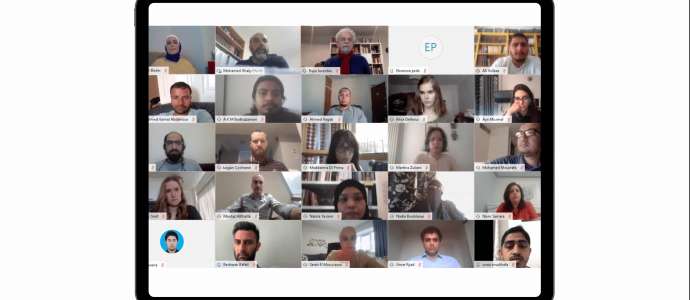
Summer School 2020
Islamic Ethics and the Covid-19 Pandemic
9-12 August 2020
Doha, Qatar (Webinar)
Open for Local and International Applicants
The Covid-19 pandemic has heavily disrupted people’s lives almost everywhere on earth. At times of uncertainty and associated panic, individuals and communities consult their moral systems to examine how thorny ethical dilemmas can be addressed. This made Covid-19 a typically intriguing bioethical phenomenon, which triggered global discourse on related moral issues. Discussions in the West suffer from serious lacunae when it comes to religious perspectives in general and Islam in particular. Parallel deliberations within Islam are still immature and still have to critically engage with international discussions.
This summer school provides participants interested in Islamic Ethics with the necessary knowledge and skills to critically engage with the global bioethical discourse on the Covid-19 pandemic. Participants will become familiar with case studies of pandemic diseases and their effects on Muslim societies in medieval, colonial and contemporary times. They will be exposed to a variety of legal, theological, and historical treatises on pandemic diseases written by Muslim scholars in their own times.
Interdisciplinarity will be the overarching method of the Summer School, which will facilitate conducting in-depth and critical analyses of a vast literature and various perspectives. Participants will study not only the religio-legal importance of Muslim writings about pandemics, but also the historical chronicling of plague epidemics throughout history and their relevance to current ethical discussions about Covid-19.
In order to put Islamic ethical discussions on Covid-19 in their proper context, the lectures will cover three main components:
- (1) An historical overview of the ethical discussions on early plagues and how far they were influenced by available scientific knowledge - from classical Miasma theory up to modern epidemiology and virology.
- (2) Ethical approaches and discourses on Covid-19, including secular bioethics and varying Islamic approaches i.e. scriptural, theological and juristic approaches; and
- (3) Key ethical issues such as congregational rituals, medical rationing and triage.
For more information about the program and the teaching faculty, please read the attached document.
Participation Assignments
Accepted applicants will be given a Reader with all the reading materials. Each successful applicant is expected to prepare well for the Summer School, by going through these materials in advance and by engaging in interactive discussions throughout the course.
Application, Deadline & Contacts
Please submit the following document by July 20, 2020
- (A) Short CV, and
- (B) A statement (max. 500 words) explaining your educational background, motivation for taking the Summer School, and how you think this activity can help you in your future plans.
Interested applicants must send the two documents to summerschool@cilecenter.org
>>Please note that only the applications received through this e-mail account will be considered<<
If you have any questions about the Summer School, please contact:
- Dr. Mutaz al Khatib (malkhatib@hbku.edu.qa)
- Dr. Umar Ryad (amr.ryad@kuleuven.be)
Organizers
- Research Center for Islamic Legislation & Ethics (CILE), College of Islamic Studies, Hamad Bin Khalifa University
Islamic Ethics is one of the emerging scholarly fields with promising growth potential in academic research and also with great appeal among the general public. The Research Center for Islamic Legislation and Ethics (CILE) has been contributing to this emerging field through various ways. Besides organizing international conferences and research seminars, CILE has also contributed to the field through pioneer academic initiatives. In collaboration with the renowned publisher Brill, CILE established the Journal of Islamic Ethics and the book-series Studies in Islamic Ethics. Additionally, the first-of-its-kind M.A. program “Applied Islamic Ethics” was inaugurated this academic year (2019-2020) in the College of Islamic Studies at Hamad Bin Khalifa University, to which CILE is affiliated. The program addresses how Islam, as a world religion with a rich moral tradition, engages with and contributes to the global moral discourse. Its strong interdisciplinary character combines in-depth knowledge of both theoretical and applied ethics rooted in the Islamic moral tradition.
- Leuven Centre for the Study of Islam Culture and Society
KU Leuven was established in 1425 and is the oldest university in the Low Countries. Today, KU Leuven accommodates 50,000 students, spread across the various campuses in Leuven and elsewhere in Flanders. It ranks among the world’s top one hundred universities. Arabic and Islamic Studies is based at the Faculty of Arts, which hosts various research units and groups in cultures, history, literatures and languages. The Faculty of Arts is also the chair of the recently-established interfaculty Leuven Centre for the Study of Islam and Society (LCSICS) as part of the long-standing commitment of KU Leuven to the development of scholarship of Islam and Muslim societies. The Centre is an interdisciplinary crossroad for scholars and researchers at KU Leuven in various fields, including theology, religious studies, history, law, philosophy, philology, literature, anthropology, sociology, social and cultural psychology, cultural studies, and the arts. The new Centre is expected to play a leading role in the interdisciplinary and comparative study of Muslims, Muslim Societies, Muslim Communities in the diaspora, and Islam between and across the boundaries of traditional area studies programs on national and international levels.


















Add new comment